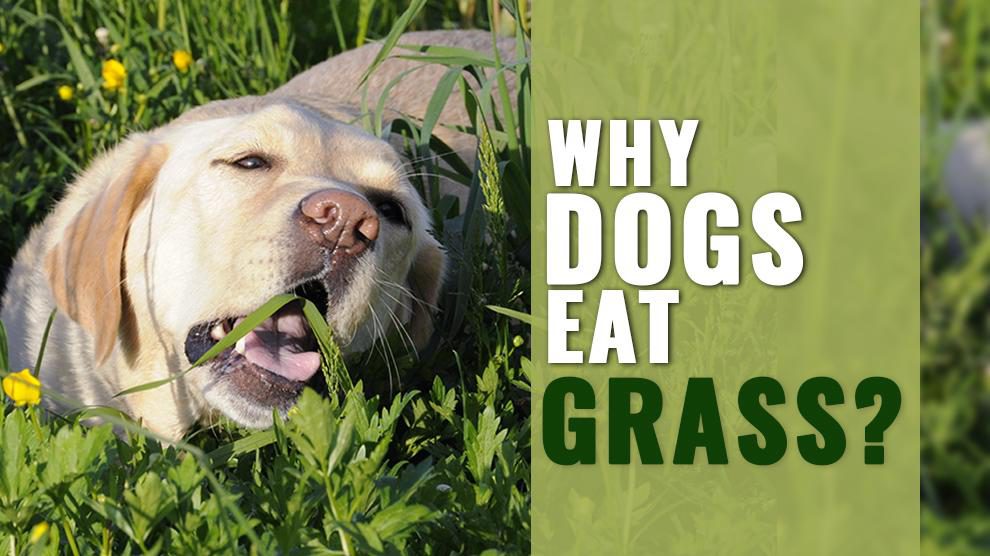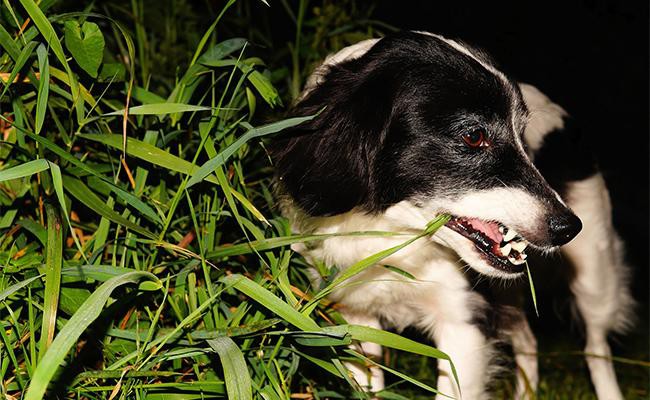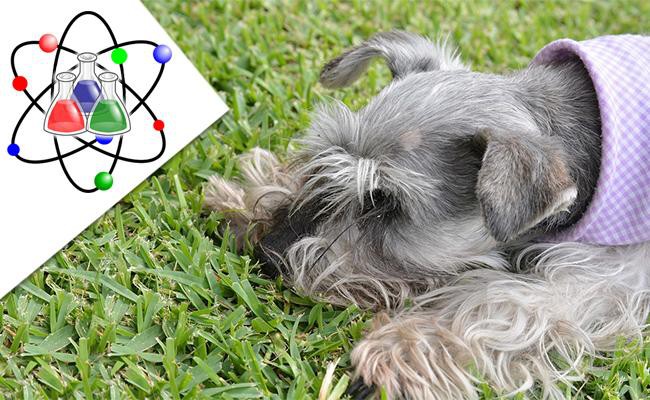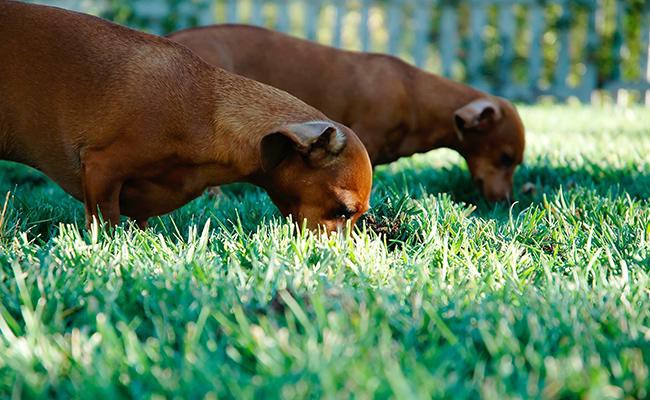Dog Pregnancy Calculator And Timeline
Your dog is descendent of the wily wolf, a confirmed carnivore, and an honorable hunter. You feed your dog with a perfectly well-balanced diet. But, why do dogs eat grass?
When your pup pecks away at the grass in the park once in a while, you might not think twice. However, if your dog always has a penchant for pasture picnics, perhaps you will be wondering if your dog is going a bit crazy.
Sometimes your dog immediately gulps several mouthfuls of grass and promptly vomits it all up and then goes right back to eating more grass! It’s a common canine behavior that baffles many pet owners.
What are they trying to do? Are they trying to make themselves pass something? Why are they trying to make themselves vomit? Are they attempting to clear their intestinal tract of parasites or foreign objects?
While no one is sure of why they eat grass, pet professionals are rather certain it’s just normal behavior and certainly nothing to worry about.
But why do they do it?
Ah… This is the million-dollar question.
Why Do Dogs Eat Grass?
The genuine fact is that no one really knows the reason for dogs eating grass. Sorry to disappoint you. There are some speculations to interpreting the behavior. However, many experts give mixed explanations, often conflicting amongst themselves.
There’s no single definitive explanation. Different dogs may munch grass for different reasons.
Are There Physical Reasons Behind Dog Eating Grass?
Gastrointestinal Trouble?
As of now, the most common explanation with many dog owners is that eating grass relieves the dog from its gastrointestinal issues including upset stomach, diarrhea, bloating, illness from pathogenic microbes, and nausea.
The grass causes gastric irritation (the blades tickle and scratch at the neck and stomach lining) that leads to vomiting, which helps the dog feel better.
To say that clearly, the dog eats grass “to clear”, or to stimulate vomiting and therefore to ease from the distress and pain in their guts.
However, there’s little evidence to support this theory; normal dogs also eat grass and only 25% of dogs actually vomit after consuming grass.
Nutritional Needs?
The other reason why they eat grass is to add fiber to their high-protein diet and this idea is also widely recognized.
There is some indication that dogs with restrictive or low-nutrient diets may choose to scavenge in the grass to fulfill this nutritional deficiency.
Are There Psychological Reasons Behind Dog Eating Grass?
Primitive Instincts?
Some pet intuitionalists propose that this is simply an ancient dietary addition that is acquired from the wolf believed to be their ancestor.
Modern dog ancestors were opportunistic scavengers who would usually eat the entirety of their grass-eating prey, including the stomach contents.
The speculation is that the desire to eat grass stems from this evolutionary leftover from their scavenger ancestors.
Nowadays domesticated dogs normally do not hunt for their food but dogs still have the natural snaring and scavenging instinct. But they have a natural drive to eat grass as an alternative food source.
Palate?
Dogs are in fact, omnivores and with their ability to munch through (and seemingly enjoy) a wide variety of foods, it makes sense that your pooch may like the taste or texture of grass – much like many people eat celery or lettuce.
So they may think, why not take advantage of such an abundant meal? This theory sounds good. After all, who among us doesn’t love a free salad?
Sheer Boredom?
The unspoken reason for eating grass may just be as simple as the fact that your dog is bored and grass gives him something to do.
Have you noticed grass-eating incidences will be higher when he is alone in the backyard but less so when you’re on a walk together?
Moreover, bored with a particularly monotonous diet (eating kibbles or dry foods every day), the dog gets fed up and seeks a range of flavors.
It’s also a kind of attention-seeking behavior; the dog may try to gain interaction with its owner by engaging in forbidden behaviors.
The dog that eats grass is trying to tell its pet parent that it needs more attention from them much like the playful toddler who draws on the walls would do.
Why Do Dogs Eat Grass And Vomit?
There is a shocking lack of scientific studies on this common subject. When you Google, “why dogs eat grass,” you’ll find more than a million results, that purportedly deal with the issue.
But, if you try to find scholarly articles on the subject, there is nothing.
Most of them have stated dogs eat grass is to deal with a stomach upset and to cause vomiting.
This reason is not satisfying. The cause and effect issues are — “Do dogs really eat grass to vomit? Or they’re vomiting because they ate grass?”
The other question is that many canines eat grass and don’t end up vomiting.
So far, only a few studies were attempted to find the scientific phenomenon of grass eating in dogs.
The most recent research was conducted at the University of California which was published in the journal Applied Animal Behavior Science in 2008.
The survey found that it was the younger dogs and not senior ones that ate grass most frequently. But they are less likely to appear ill prior to eating or vomit after eating grass.
The research did find, however, that the dogs which had any previous ailments are more likely to vomit than the healthy ones.
The scientists finally resolved that ‘a dog eating grass is a normal behavior in normal dogs and is generally not associated with dietary needs or with illness.
They went on to suggest that dogs may have inherited this evolutionary grass-eating habit from their wild ancestors – wolves. The wild canines ate grass occasionally so that it can help to purge intestinal parasites.
While most pet dogs are free of such worms, but they may still have that penchant to eat grass as this innate habit got etched in their genetic memory which was once beneficial to their wild ancestors.
Should I Stop My Dog from Eating Grass?
Don’t worry. It’s gonna be OK. Most veterinarians and pet-behaviorists suggest that this behavior is a natural instinct and is not harmful to the dogs.
Most of them agree that it is actually safe and non-worrisome if they ponder on them infrequently. For whatever reasons they eat grass, dogs know what they’re doing.
While your pooch doesn’t gain anything of real nutritional value from grass, it also may not hurt them as long as there are no dangerous pesticides, herbicides or fertilizers used on the grass itself.
When your pups unleash their inner cow and graze on grass compulsively or when grass eating turns from gourmet passion to problematic everyday behavior, then this may be due to an underlying issue and may require vet attention.





















